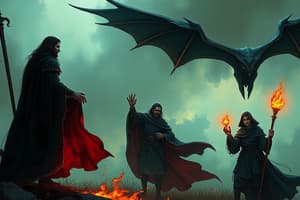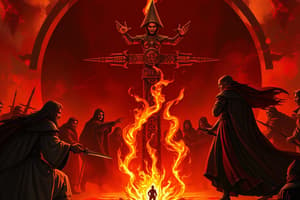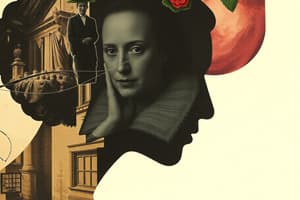Podcast
Questions and Answers
What does Lady Macduff mean when she says, 'when our actions do not, our fears make us traitors'?
What does Lady Macduff mean when she says, 'when our actions do not, our fears make us traitors'?
- They are guilty of bad deeds.
- They are innocent but fear makes them traitors. (correct)
- They are brave despite the fear.
- They fear Macbeth's rule yet continue to act.
How does Lady Macduff feel about Macduff leaving for England?
How does Lady Macduff feel about Macduff leaving for England?
She feels betrayed and believes he prioritizes Scotland over his family.
What does the wren symbolize in Lady Macduff's statement about fighting the owl?
What does the wren symbolize in Lady Macduff's statement about fighting the owl?
The wren symbolizes vulnerability and the protection of her young.
How does Ross describe Macduff?
How does Ross describe Macduff?
What does Ross mean by 'but cruel are the times, when we are traitors and do not know ourselves'?
What does Ross mean by 'but cruel are the times, when we are traitors and do not know ourselves'?
What does Ross imply by saying, 'when we hold rumour from what we fear, yet know not what we fear'?
What does Ross imply by saying, 'when we hold rumour from what we fear, yet know not what we fear'?
What metaphor does Ross use to describe Scotland under Macbeth's rule?
What metaphor does Ross use to describe Scotland under Macbeth's rule?
What does Ross suggest will happen if Macduff does not go to England?
What does Ross suggest will happen if Macduff does not go to England?
What paradox is presented in Lady Macduff's statement, 'Father'd he is, and yet he is fatherless'?
What paradox is presented in Lady Macduff's statement, 'Father'd he is, and yet he is fatherless'?
What does Lady Macduff's line 'Sirrah, your father's dead' signify?
What does Lady Macduff's line 'Sirrah, your father's dead' signify?
What biblical reference is made when the Son says, 'as birds do mother'?
What biblical reference is made when the Son says, 'as birds do mother'?
What does Lady Macduff mean by 'what, with worms and flies'?
What does Lady Macduff mean by 'what, with worms and flies'?
What is the significance of Lady Macduff's line, 'Poor bird! thou'ldst never fear the net nor the lime'?
What is the significance of Lady Macduff's line, 'Poor bird! thou'ldst never fear the net nor the lime'?
Flashcards are hidden until you start studying
Study Notes
Lady Macduff's Perspective
- "When our actions do not, our fears make us traitors" highlights the impact of Macbeth's tyranny, as the innocent feel threatened and betray their loyalty.
- Lady Macduff expresses betrayal through "to leave his wife, to leave his babes," revealing her feelings about Macduff's patriotism overshadowing family duties.
Animal Imagery
- Lady Macduff compares Macduff's absence to a wren defending her young, illustrating vulnerability and the consequences of leaving family to fight tyranny.
Character Contrast
- Ross describes Macduff as "noble, wise, judicious," contrasting him with Macbeth, reinforcing the theme of good versus evil.
Themes of Time and Ambiguity
- "Cruel are the times, when we are traitors and do not know ourselves" comments on the confusion and intensity of events as the play progresses, highlighting the urgent pursuit of ambition.
- Ross notes "when we hold rumour from what we fear," addressing deception and the uncertain fear surrounding Macbeth's actions.
Metaphors and Pathetic Fallacy
- "Float upon a wild and violent sea" serves as a metaphor for the chaos and brutality engulfing Scotland under Macbeth's rule.
- "Things at the worst will cease, or else climb upward" signifies Macduff's quest for truth, suggesting escalating dangers if he remains passive.
Supernatural and Paradox
- Lady Macduff’s statement "Father'd he is, and yet he is fatherless" introduces paradox, connecting to the supernatural themes, foreshadowing Macduff's pivotal role in Macbeth's defeat.
Maternal Bond and Innocence
- "Sirrah, your father's dead" illustrates the close bond between Lady Macduff and her son, contrasting with Lady Macbeth's ruthless nature.
- The son's reference to "as birds do mother" invokes biblical imagery, emphasizing the purity and innocence of the Macduff family amidst the tyranny of the Macbeths.
Great Chain of Being
- Lady Macduff's "what, with worms and flies" reflects the natural order and God's hierarchy, critiquing Macbeth's sinful actions that disrupt this balance.
- "Poor bird! thou'ldst never fear the net nor the lime" symbolizes the fragility of innocence, drawing attention to the vulnerability of those affected by Macbeth's ambition.
Studying That Suits You
Use AI to generate personalized quizzes and flashcards to suit your learning preferences.




